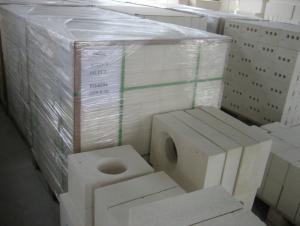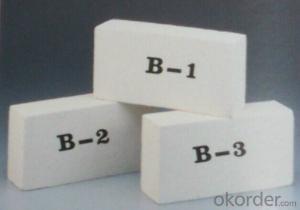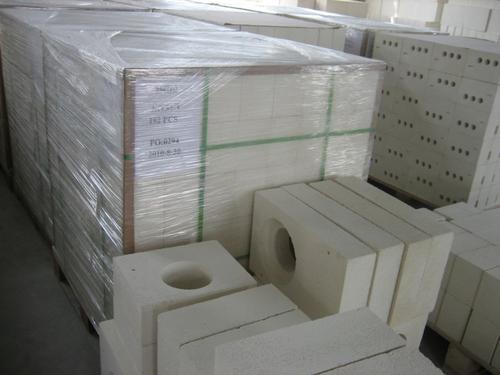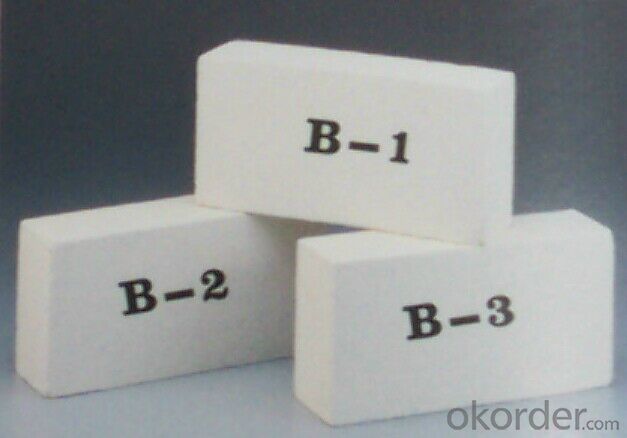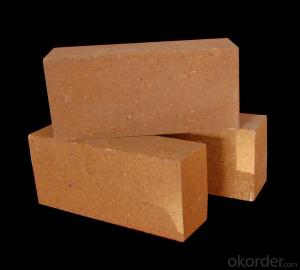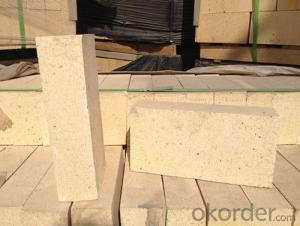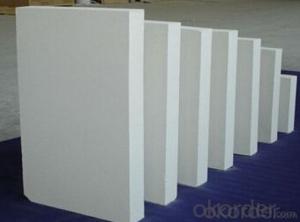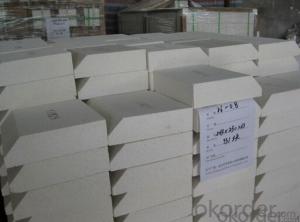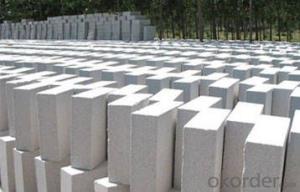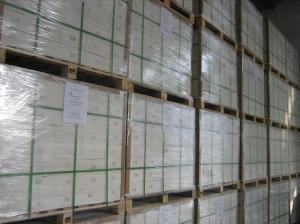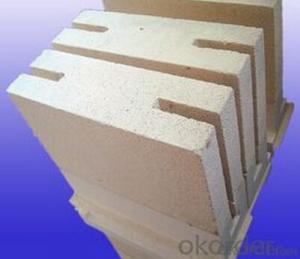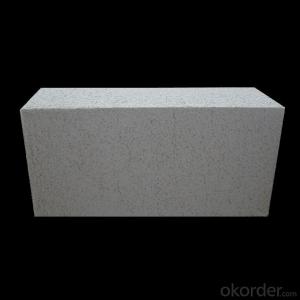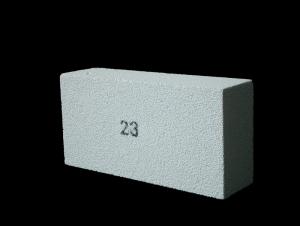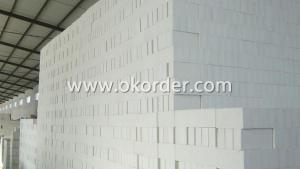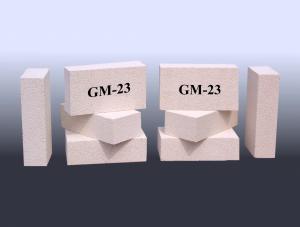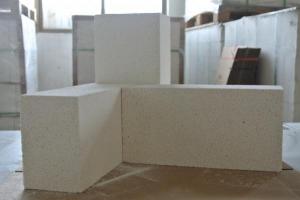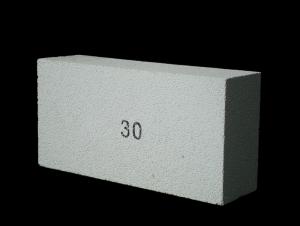Insulating Fire Brick - Refractory Mullite Insulating Fire Brick GJM23
- Loading Port:
- Shanghai
- Payment Terms:
- TT OR LC
- Min Order Qty:
- 20 m.t.
- Supply Capability:
- 100000 m.t./month
OKorder Service Pledge
OKorder Financial Service
You Might Also Like
General Information
CMAX insulating firebricks are classified under temperature between 1300℃ to 1700℃, manufactured from high purity alumina clay.
1. Lower content of iron, alkaline and impurities, good high temperature properties.
2. Homogeneous structure, light weight, energy saving because lower heat storage in the furnace during cooling cycles.
3. High strength, good thermal shock resistance under high temperature.
4. Precise sizes due to grinding and shaping after sintering, which meets the requirement of construction.
5. Max service temp: Up to 1730C (3160F)
Feature
Light weight and low thermal conductivity
Low heat storage
Low iron and impurities
High thermal shock resistance
Application
CMAX insulating firebricks can be used as a hot face lining directly exposed to the heat or as a backup insulation layer in iron and steel mills, non-ferrous foundries, petrochemical, ceramic, glass.
ITEM | GJM30 | GJM28 | GJM26 | GJM23 |
Classification Temperature, ℉/℃ | 3000/1650 | 2800/1540 | 2600/1430 | 2300/1260 |
Bulk Density,g/cm³ | ≤1.0 | ≤0.9 | ≤0.8 | ≥0.5 |
Reheating Linear Change, % | ≤0.9 (1550℃,12 h) | ≤0.8 (1510℃,12 h) | ≤0.7 (1410℃,12 h) | ≤0.5 (1230℃,12 h) |
Al2O3 Content, % | ≥75 | ≥65 | ≥55 | ≥45 |
Fe2O3 Content, % | ≤0.5 | ≤0.6 | ≤0.7 | ≤1.0 |
Thermal Conductivity: | ||||
800℃, w/m.k | ≤0.39 | ≤0.37 | ≤0.35 | ≤0.18 |
1000℃, w/m.k | ≤0.43 | ≤0.41 | ≤0.39 | ≤0.20 |
1200℃, w/m.k | ≤0.48 | ≤0.46 | ≤0.43 | --- |
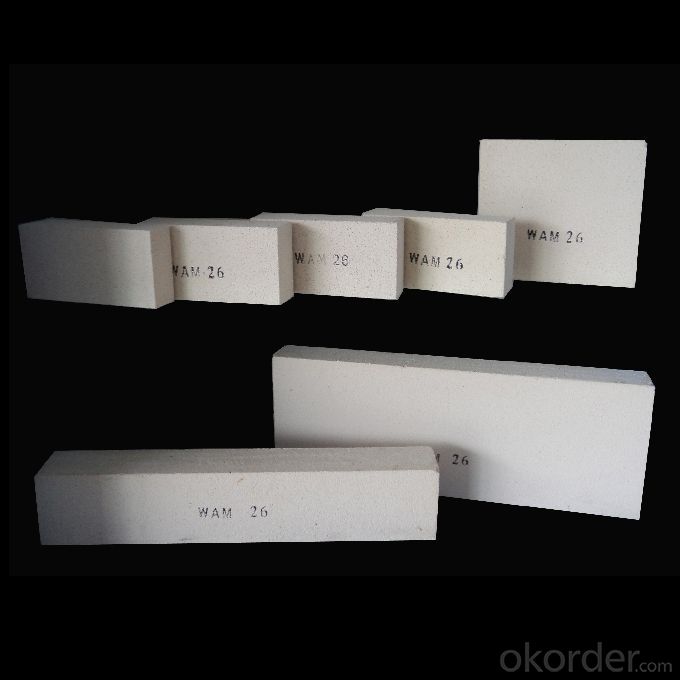
- Q: Are insulating fire bricks safe to use?
- Yes, insulating fire bricks are safe to use. They are specifically designed to withstand high temperatures and are made from non-toxic materials that do not emit harmful gases or substances when heated. They provide excellent insulation and are commonly used in various applications such as kilns, furnaces, and fireplaces.
- Q: How do insulating fire bricks help improve the efficiency of heat treatment processes?
- Insulating fire bricks help improve the efficiency of heat treatment processes by effectively reducing heat loss. Due to their low thermal conductivity, these bricks act as a barrier, preventing heat from escaping and maintaining high temperatures for longer periods. This allows the heat treatment process to be more energy-efficient, as less energy is required to achieve and maintain the desired temperatures. Additionally, insulating fire bricks help to evenly distribute heat, resulting in more consistent and uniform heat treatment outcomes.
- Q: Can insulating fire bricks be used in the construction of hearth furnaces?
- Yes, insulating fire bricks can be used in the construction of hearth furnaces. Insulating fire bricks are specially designed to have low thermal conductivity, which makes them ideal for applications where heat insulation is required. In the construction of hearth furnaces, where high temperatures are involved, insulating fire bricks can help to retain the heat within the furnace and improve energy efficiency. They can also provide thermal protection to the surrounding structures by minimizing heat transfer. Additionally, insulating fire bricks are lightweight and easy to handle, which makes them convenient for construction purposes. Overall, using insulating fire bricks in the construction of hearth furnaces can enhance their performance and contribute to a more efficient and effective heating process.
- Q: Are insulating fire bricks resistant to carbon dioxide?
- Insulating fire bricks, also known as refractory bricks, are designed to withstand high temperatures and are generally resistant to various chemicals and gases. However, their resistance to carbon dioxide may vary depending on the specific type and composition of the insulating fire brick. Carbon dioxide (CO2) is a non-flammable gas that is usually present in the atmosphere and is released during the combustion of carbon-based fuels. In most cases, insulating fire bricks have a high resistance to carbon dioxide due to their high melting point and the presence of refractory materials such as alumina and silica. However, prolonged exposure to high concentrations of carbon dioxide, especially at elevated temperatures, can cause some insulating fire bricks to undergo chemical reactions that may lead to degradation or reduced performance. It is important to consider the specific application and environment in which the insulating fire bricks will be used. If the insulating fire bricks are part of a furnace or kiln that generates significant amounts of carbon dioxide, it is advisable to choose bricks specifically designed for such conditions. These bricks may have additional protective coatings or higher chemical resistance to ensure their longevity and performance. In summary, while insulating fire bricks generally have good resistance to carbon dioxide, it is important to consider the specific type of brick and the conditions under which it will be used to ensure optimal performance and longevity.
- Q: Can insulating fire bricks be used for insulation in aluminum smelters?
- Yes, insulating fire bricks can be used for insulation in aluminum smelters. Insulating fire bricks are designed to withstand high temperatures and provide excellent thermal insulation, making them suitable for use in aluminum smelters where extreme heat is generated.
- Q: Do insulating fire bricks have a high insulation efficiency?
- Yes, insulating fire bricks have a high insulation efficiency. These types of bricks are specifically designed to provide excellent thermal insulation properties. They are made from lightweight materials with low thermal conductivity, such as various types of refractory clay or alumina. This composition allows them to effectively minimize heat transfer through conduction, making them highly efficient at retaining heat within a structure or appliance. Insulating fire bricks also have a high porosity, which further enhances their insulation capabilities. The presence of numerous small air pockets within the bricks reduces heat transfer by convection, as the air acts as an insulating barrier. This unique structure helps to maintain a consistent and stable temperature, whether it is in a furnace, kiln, or any other high-temperature environment. Furthermore, insulating fire bricks have high resistance to thermal shock, meaning they can withstand rapid changes in temperature without cracking or deteriorating. This property is crucial in applications where temperature fluctuations are common, as it ensures the longevity and effectiveness of the insulation. Overall, insulating fire bricks are known for their high insulation efficiency. They provide excellent thermal insulation, prevent heat loss, and contribute to energy savings. Whether used in industrial settings or residential constructions, these bricks offer reliable insulation performance and contribute to the overall energy efficiency of the system they are employed in.
- Q: Energy saving bricks or bricks?
- Insulating bricks are mostly hollow or light bricks.It can be said to be energy-saving bricks, including insulation bricks
- Q: Are insulating fire bricks resistant to molten metals?
- Yes, insulating fire bricks are generally resistant to molten metals. Insulating fire bricks are made from refractory materials that have high melting points and excellent thermal insulation properties. This makes them suitable for applications where they come into contact with high temperatures, including molten metals. The insulating properties of these bricks help to minimize heat transfer, preventing the heat from the molten metal from being conducted through the brick. Additionally, the refractory materials used in these bricks have low thermal expansion, which allows them to withstand thermal shock that can occur when molten metals come into contact with the bricks. However, it is important to note that the specific resistance of insulating fire bricks to molten metals can depend on factors such as the type of metal, temperature, and duration of exposure. Therefore, it is recommended to consult with the manufacturer or a professional to ensure that the insulating fire bricks are suitable for the specific application involving molten metals.
- Q: How do insulating fire bricks prevent heat loss?
- Insulating fire bricks have been specifically engineered to prevent the loss of heat in a wide range of applications. These bricks are crafted from refractory materials that possess exceptional thermal insulation properties. Their structure contains small air pockets that serve to minimize the transfer of heat through conduction and convection. One effective method employed by insulating fire bricks to prevent heat loss involves their low thermal conductivity. When compared to other materials, these bricks exhibit significantly lower thermal conductivity, which means they are less efficient at transmitting heat. This characteristic enables them to function as a barrier, impeding the transfer of heat from one side of the brick to the other. Moreover, the presence of tiny air pockets within the bricks creates a thermal barrier. Due to the poor heat-conducting properties of air, these air pockets effectively trap heat within the brick, preventing its escape. This insulation property aids in retaining heat within the desired area, thereby reducing heat loss and enhancing energy efficiency. Furthermore, insulating fire bricks possess the ability to prevent heat loss through heat reflection. These bricks boast a high emissivity, enabling them to reflect a considerable amount of heat back into the desired space. This reflection works to maintain a higher temperature within the area and prevent the dissipation of heat. In conclusion, insulating fire bricks effectively prevent heat loss by diminishing conduction and convection through their low thermal conductivity, confining heat within small air pockets, and reflecting heat back into the desired space. These bricks play an indispensable role in diverse applications where heat retention is of utmost importance, such as kilns, furnaces, and other high-temperature environments.
- Q: What is the recommended method for installing insulating fire bricks?
- The recommended method for installing insulating fire bricks involves several steps to ensure proper insulation and structural integrity. Here is a step-by-step guide: 1. Prepare the surface: Make sure the surface where the insulating fire bricks will be installed is clean and free from debris. Remove any loose or damaged bricks from the area. 2. Measure and plan: Measure the area where the bricks will be installed and plan the layout accordingly. Take into consideration any openings or corners that may require special cutting or shaping of the bricks. 3. Cut the bricks: Use a diamond blade saw or a masonry saw to cut the insulating fire bricks to the desired size and shape. Wear appropriate protective gear, such as safety goggles and a dust mask, when cutting the bricks. 4. Apply adhesive: Apply a thin layer of refractory adhesive or mortar to the surface where the first brick will be placed. Spread the adhesive evenly using a trowel or a notched trowel. 5. Place the bricks: Carefully place the first brick onto the adhesive, pressing it firmly into place. Ensure that it is level and aligned with the adjacent bricks. Repeat this step for the remaining bricks, leaving a small gap between each brick for expansion. 6. Fill the gaps: Fill the gaps between the bricks with refractory mortar, using a trowel or a grout bag. Press the mortar firmly into the gaps to ensure a tight seal. 7. Allow for curing: Let the adhesive and mortar cure for the recommended time, usually 24 to 48 hours. This will ensure that the bricks are securely bonded and ready for use. 8. Test and insulate: After the curing period, test the installation by gently tapping the bricks to check for stability. Once confirmed, you can proceed with insulating the surrounding area if required, following the manufacturer's instructions. Remember to always follow the specific instructions provided by the manufacturer of the insulating fire bricks and any adhesive or mortar being used. Additionally, it is advisable to consult with a professional or experienced installer if you are unsure about any step of the installation process.
Send your message to us
Insulating Fire Brick - Refractory Mullite Insulating Fire Brick GJM23
- Loading Port:
- Shanghai
- Payment Terms:
- TT OR LC
- Min Order Qty:
- 20 m.t.
- Supply Capability:
- 100000 m.t./month
OKorder Service Pledge
OKorder Financial Service
Similar products
Hot products
Hot Searches
Related keywords
